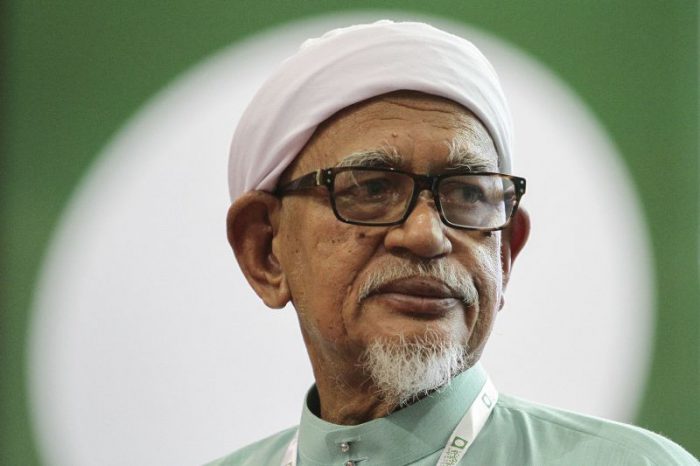The weekend began with the unexpected acclamation of Datuk Seri Abdul Hadi Awang’s heretofore unannounced bid for Prime Minister by an enthusiastic crowd at PAS’s 58th annual Muktamar, and then ended with the even more unexpected acceptance of that acclamation by the man himself.
While one might be inclined to brush this aside as the normal PAS bumbling ahead of GE13, the fact that neither Datuk Seri Anwar Ibrahim nor any of DAP’s Lim Dynasty have seen fit to rebuke him or PAS raises the very real possibility that through what appears to be an accident of political hysteria, a man who less than a year ago claimed he wanted to retire may now be Pakatan Rakyat’s Prime Minister-in-waiting.
It is therefore reasonable to consider what a PAS premiership might mean.
Firstly, it is important to dispense with the notion that the DAP leadership would see Abdul Hadi’s bid for power as the last straw in the Pakatan Rakyat pact. Party Chairman Karpal Singh has waged a lonely battle against PAS’s hudud law project, one never appreciably joined by Lim Kit Siang and Lim Guan Eng. While many of DAP’s supporting voters would indeed rebel, the fact that as of this writing no major Opposition web portal has even broached the danger to the alliance makes clear that this is not a bridge too far.
If those portals — all of whom take their direction from PKR and DAP — are silent, then one may reasonably assume DAP would be, too.
Secondly, let us take PAS at their most recent word — from Abdul Hadi himself — that PAS would at most only seek to impose hudud law on Muslims, leaving non-Muslims free to practise their own traditions. (Abdul Hadi compared this to alcohol use, an interesting choice given the number of times PAS governments have worked to ban alcohol for Muslims and non-Muslims where they govern.) Despite the fact that no one outside of Pakatan Rakyat’s cybertroopers would believe such a thing, assume this is true.
It changes very little.
PAS may have become disturbingly electorally clumsy over the last two years, but they understand better than their Pakatan allies that the winners of cultural battles control the future in a way that electoral winners do not. Even as Abdul Hadi was saying all of the correct things about PAS needing other parties to govern and hudud law being only for Muslims, his party had just concluded a gathering calling on the Government to end K-pop, J-pop, and many American artists’ presence here. Decrying the effect on good morals and education, the Muktamar unanimously passed a motion saying: “The Malaysian government tends to serve excessive entertainment towards the young generation through media channels … (such things as) superstition, K-pop, J-pop, so much pop is shown.”
One only needs to look at Indonesia, where the Islamist parties only asked for control over cultural ministries and radicalisation proceeds apace as never before. This may be the end game for which PAS are aiming. All of Pakatan Rakyat’s defensive talk of hudud law needing a constitutional amendment can be rubbished effectively by noting that PAS are not looking to enact hudud law tomorrow, but rather over time; and once they have managed to enact hudud for Muslims, they have yet to formalise any reason why they should not include non-Muslims as well.
Thirdly, it behooves us to examine why it is that Pakatan Rakyat have made Penang and Selangor the states they claim would inspire them should they take Putrajaya, rather than Kelantan (or Kedah, or for a single government, Terengganu). Waste, corruption, chronic infrastructure mismanagement and decay, natural resource mismanagement, attacks on minority religions: all of these things are commonplace in PAS states.
And, of course, hudud. In Terengganu, the attempt to impose hudud law arguably led to the breakup of Barisan Alternatif and the Opposition’s near-destruction at GE11. In Kelantan, the imposition of hudud law helped spark the ongoing battle between Karpal Singh and PAS, and to a certain extent the latest debate over PAS’s vision for hudud. In Kedah, whilst hudud is not precisely on the table, the state assembly changed the law in April so that any fatwa by the state mufti or Fatwa Committee, whether gazetted or not, cannot be challenged, appealed, reviewed, denied or questioned in any civil court or syariah court.
If Abdul Hadi’s party would do this in every state they have had a chance to govern, what rational reason is there to believe they would not work to do the same in the nation as a whole?
One can reasonably assert that Abdul Hadi as Prime Minister would not lead to an apocalyptic self-immolation of the nation. It would instead lead to the slow and deliberate imposition of PAS’s radical ideas on the nation’s culture, broadcast programming, Internet, and religious expression. It would reverse our economic growth and transformation. In short: it would have ruinous consequences for the country and the wellbeing of its people.
Given PAS’s low standing in the Dewan Rakyat and in recent polling, it seems reasonably clear that most Malaysians would want nothing to do with such a future. Somewhat oddly, this does not appear to resonate with Pakatan Rakyat’s leadership at all.

